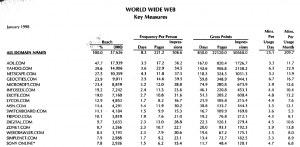Is Web 3.0 the Age of Consent?


Web 1.0 was built on smoke and mirrors.
Web 2.0 was built with the user as the product.
Web 3.0 will be built on consent.
Mark Wachen of Upstage Ventures recently spoke at our investor breakfast and gave a fascinating history of the rise and fall of Web 1.0. For reference, when Mark first met with Yahoo in the early days, they were just six employees, and on the upswing. As he pointed out, “Yahoo isn’t what it used to be and is working its way back down to six employees.” Mark was working for Sony at the time – a company all Internet companies wanted to work with back then: Sony was the Apple of that day. But as Wachen pointed out, Sony made a lot of mistakes along the way and is not the company it used to be.
“You think things are all set, and they’re not in this industry.” He brought along a print out (by Media Metrics, nee PC Meter) of the top web properties as of January 1998, with AOL and Yahoo topping the list. The chart is available here.
“As you’ll see, most of these companies are (now) non-factors. At the time, everyone believed that AOL, Yahoo and Netscape would be the dominant brands for the rest of history. Most have gone away. It’s interesting that Amazon is on the list. It’s the only new media brand that’s still a dominant one.
Even Jeff Bezos has conceded that Amazon won’t be around forever, However, here’s an eye-opener: I Tried to Block Amazon From My Life. It Was Impossible.
When did anyone consent to this?
As Mark pointed out, from ‘97-‘98 there was an Internet boom. Newcos were springing up everywhere, and money was being thrown at them, with the philosophy being, Invest now, ask questions later. The strategy: get big fast and ask questions later.
Like, what’s your revenue model? The bubble did burst. Seems that strategy didn’t work out so well, what, eh?
It also seems that the more things change, the more they stay the same, and interesting how the Age of Social has mimicked a lot of Web 1.0 and in hindsight, not in any better a way than we witnessed in those early days.
Many of the Web 1.0 companies were built on smoke and mirrors.
Speaking of which, it seems that “Facebook has been lying to the public about the scale of its problem with fake accounts, which likely exceed 50% of its network,” reports Plainsite …”Accordingly, it is increasingly likely that Facebook will go the way of AOL, CompuServe, and Prodigy—if legal liability doesn’t bankrupt it first.”
When the user is the product, who wouldn’t want more and more product? There’s no cost to creating fake accounts – but there is a big potential payoff, as we’ve witnessed.
Presently, there is no form of checks and balances to determine whether Facebook accounts are real or not. But this fraud cannot hold with the coming of GDRP and the age of informed consent.
We often hear the expression, “too big to fail,” and to hear Wachen’s perspective of the Web 1.0 days is a reminder, as it applies to tech, that concept may well be part of the myth and lore of the industry. There was a time when most people believed that having an AOL account was absolutely necessary in order to access the World Wide Web and as it turned out, one-time market leaders AOL, Yahoo and Netscape did not prove to be the dominant brands for the rest of history, despite all appearances to the contrary at the time.
There are companies that established a web presence in the first Internet wave that are still alive and well and thriving: Apple, Microsoft and yea, even Amazon, to name a few. Purveyors of products. Yet even the biggest of companies lost up to 90% of their value when the first bubble burst. With Facebook’s manipulations and falsifications coming to light, and with GDRP upon us, time will tell, in this oncoming age of consent, how much of the air will be zucked (sic) out of the market in an era where the lifesblood of a company is dependent on consumers being the product. The surveillance economy, like everything else, will have its day and that, too, shall pass, as we’re now witnessing. If Facebook et al believed it would go on, unchecked, in perpetuity, we can only surmise that, all of the data collection aside, they did not understand people and cycles as well as they thought they did.Onward and forward.